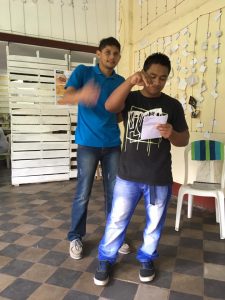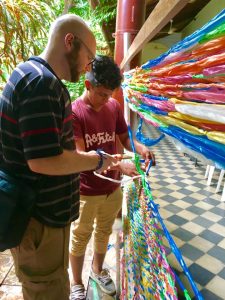Would you be able to communicate with those who are Deaf or hard-of-hearing? Even if you know American Sign Language (ASL), mos countries have their own particular sign languages.
“Tío” Antonio Prieto Buñuel, a native of Spain currently residing in Nicaragua, a country with little special education and even less opportunities for people with disabilities, wanted to show how the connection between the hard of hearing and the able is not so hard to create. His restaurant, Café de las Sonrisas, or Smiles Cafe, in Granada, Nicaragua, is staffed entirely by Deaf or hard-of-hearing people, who utilize a picture menu andwho educate visitors concerning how to communicate in basic Nicaraguan Sign Language. The cafe is more important than ever, with the civil unrest in Nicaragua leaving even able people in fear of the future, and the potential for even less opportunity for disabled people. Here are a few words from Tío Antonio about how he bridges the communication gap to educate Nicaraguans and keep the hope for his workers even in troubled times.
(Note: This interview was originally conducted in Spanish and translated into English by this author)
 What influenced your decision to open a cafe for hard-of-hearing workers?
What influenced your decision to open a cafe for hard-of-hearing workers?
At one point special education was mostly conducted at home, there were no opportunities for work and additionally others in their communities did not know how to communicate with hard-of-hearing and Deaf people. There were few opportunities.
What are some of the challenges for disabled people in Nicaragua?
There is still the belief, in both cities and the country, that disability is a punishment from God or something to be shameful of. This inspires sadness in disabled people, but we want to stop the assumption that disability is uselessness.
How do hard-of-hearing and Deaf people learn sign language in Nicaragua?
They learn in a special school, but there are still many places in Nicaragua where these don’t exist.
Is Nicaraguan sign language similar to other sign languages? Would it be possible to communicate?
In short conversations it would be more or less possible, like how similar Italian and Spanish are, but there are some large differences between countries’ signs.
How do your customers and workers communicate in the cafe?

We created a total system. In our menu, when you order a meal all of its ingredients are listed; you only have to point to an ingredient and the X to take it out. There are signs on the table for coffee, sugar, salt, etc. and the entire wall is decorated with symbols for sign language. It has been a great success.
What is a typical challenge for your customers?
The first is the surprise, when they try to talk to the workers who indicate to them that they do not hear, there are a few moments of pause, but in no time they see the alphabet and have learned something! We make it easy, just look for the symbols and you can communicate!
Are you preparing your workers for other jobs? Do many stay at the cafe or do they find new employment?
This is my big “problem;” I want them to succeed and begin other jobs, and even though they don’t want to leave, the idea is they become independent. They leave here with many skills, both those that work in the cafe and in the artisan hammock workshop.
Why did you create the GoFundMe (note: see end of article for more information)? What do you hope to accomplish with the money from the campaign?
We started the campaign because of the serious incidents in Nicaragua; there have been more than 200 deaths in 62 days, which has made tourism decrease. 75% of our city [Granada] depends on tourism.
We want to reinvent ourselves, and opening a local market, bakery, pastry shop, and ice cream store is our best option, but to do this we need to modify the kitchen and purchase machinery.
It is the hope of all these young people that one day we all believe that they aren’t different, and no we cannot say what will what happen in the future.
As you can see, Antonio is doing some great work not only for the city of Granada, but also to raise awareness of sign language and others with disabilities in the Nicaraguan community. I had the opportunity to visit the cafe when taking students to Nicaragua and Costa Rica last year, and it opened their eyes to sign language, challenges faced by marginalized communities, and many other ideas that they may have not considered without the cafe.
As of June 20th, Antonio is still short of his goal, but if you would consider donating to his GoFundMe campaign, please find the link here.
